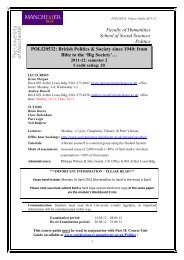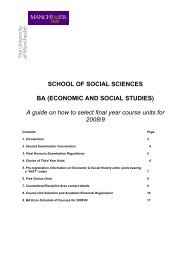CHNN 22, Spring 2008 - School of Social Sciences
CHNN 22, Spring 2008 - School of Social Sciences
CHNN 22, Spring 2008 - School of Social Sciences
Create successful ePaper yourself
Turn your PDF publications into a flip-book with our unique Google optimized e-Paper software.
there, and eaten them. There is to be sure a dead zone in the middle <strong>of</strong> the sea but this is due to its<br />
depth and high sulphur content (which may well give the Black Sea its name) and has existed from<br />
time immemorial. Peter Taafe was not the leader <strong>of</strong> the Militant group, he was a leading figure and<br />
the editor <strong>of</strong> its newspaper, but the founder and leader was Ted Grant (p400). The most startling<br />
error <strong>of</strong> all occurs on page 373 where Service writes that, ‘Althusser claimed that Marx’s analytical<br />
superiority lay in the scientific method and the corpus <strong>of</strong> Marx’s early writings; he argued that the<br />
later corpus lacked the same rigour’ – which is the exact opposite <strong>of</strong> Althusser’s view.<br />
On page 60 Service refers to Lenin receiving money from Berlin. To any reader unfamiliar with the<br />
background, the context in which this is placed – the Russian Revolution – suggests that money<br />
was supplied by the German authorities, the ‘Lenin is a German spy’ accusation used by the<br />
bolsheviks’ enemies. That may not be Service’s intention, but it reads that way (the same point<br />
reappears on p4<strong>22</strong>). In reality any finance the bolsheviks received from Germany came not from<br />
the government or the general staff but from Alexander Helphand (Parvus), a socialist eccentric<br />
who financed various sorts <strong>of</strong> revolutionary enterprises.<br />
On page 129 Service writes that skilled workers ‘became – in the Marxist jargon – a “labour<br />
aristocracy” ’. That may well be so, but the jargon was (is) not confined by any means to marxists<br />
but widely used by labour historians. On page 162 we learn that, ‘the NKVD was not renowned for<br />
its investigative scruples, especially at times when it was under pressure to fulfil its arrest quotas’.<br />
Again, not literally untrue, but as J Arch Getty and Oleg V Naumov with massive documentation<br />
demonstrate in The Road to Terror (1999), the NKVD functionaries frequently rejected anonymous<br />
delations which they considered to be without foundation.<br />
On page 312 it is pointed out that ‘no communist regime (in Eastern Europe) had come to power<br />
through the ballot box’ – which is indeed the case, but what is not recorded is that in the first<br />
general election following the liberation the Czechoslovak CP received the highest vote <strong>of</strong> any party<br />
and would certainly have come to undivided power if the British voting system had been in use,<br />
instead <strong>of</strong> having to content itself for the time being with the leading role in a popular front<br />
coalition government. When recounting the extreme horrors <strong>of</strong> the Pol Pot regime (to be fair he<br />
acknowledges that it was supported by the USA) Service writes that ‘Cambodia had experienced<br />
continuous civil war’ but omits to mention that the central cause <strong>of</strong> the Khmer Rouge ascendancy<br />
was the massive US bombing campaign in Cambodia ordered by Kissinger and Nixon.<br />
All the errors and distortions might be regarded as trivial matters and to dwell upon them as mere<br />
quibbling, but the character and extent <strong>of</strong> these blots and blemishes is not accidental, they all tend<br />
in the same direction and taken together suggest a remarkable degree <strong>of</strong> sloppiness and inaccuracy<br />
such as to badly undermine the credibility <strong>of</strong> the volume and its depiction <strong>of</strong> the communist<br />
movement. An annoying habit is his frequent citing <strong>of</strong> his own previous books as sources, which<br />
makes it impossible to check many <strong>of</strong> his assertions without having these to hand. There appears to<br />
be a sour animus against Isaac Deutscher, with rather gloating references to the latter’s mistaken<br />
estimate <strong>of</strong> the USSR’s future.<br />
As mentioned, this is a narrative history and does not pretend to a great depth <strong>of</strong> analysis, what<br />
there is <strong>of</strong> that would not be out <strong>of</strong> place in the Readers’ Digest – indeed it sometimes makes the<br />
Readers’ Digest appear sophisticated by comparison – particularly the case in his account <strong>of</strong><br />
Marx’s writings. It recycles the hairy chestnut <strong>of</strong> the communist movement being comparable with<br />
religious ones – I first encountered that in Bertrand Russell’s History <strong>of</strong> Western Philosophy,<br />
published in 1946 – and though some party members certainly assumed attitudes which imitated<br />
religious devotion, to attach religious meaning to Marx’s or Lenin’s ideas would, if true, require<br />
another word to be invented for what we’ve hitherto thought <strong>of</strong> as religion. No account is taken <strong>of</strong><br />
the importance <strong>of</strong> Lenin’s 1916 pamphlet Imperialism (it isn’t even mentioned) nor the<br />
circumstances in which the concept <strong>of</strong> ‘marxism-leninism’ was dreamed up.<br />
The tone is one <strong>of</strong> relentless hostility. Scarcely any communist, revolutionary or sympathiser is<br />
introduced without a sneer, though, again to be fair, the second half <strong>of</strong> the volume is relatively<br />
more balanced and a number <strong>of</strong> the achievements <strong>of</strong> certain communist regimes are acknowledged,<br />
if grudgingly; Service’s tank <strong>of</strong> bile here becomes somewhat depleted, though never entirely<br />
exhausted. The paradigm in which he places the movement is the ‘totalitarian’ one, well discredited<br />
some decades ago, but now experiencing strenuous efforts at resuscitation.<br />
57
















